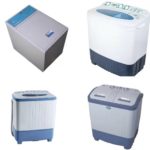Manufacturers of washing machines work tirelessly to create new, more advanced and sophisticated washing machines. However, the segment of simpler models does not remain without attention, simpler and more reliable semi-automatic washing machines continue to descend from the conveyor. What kind of appliance is this, who buys it and why, what are its advantages and, in general, how to choose a semi-automatic washing machine.
What is the difference between a washing machine and a semi-automatic machine
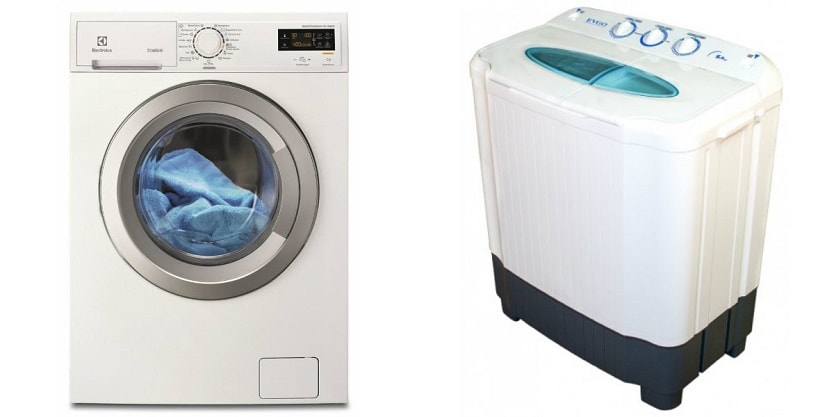
The washing process in a modern automatic machine is completely autonomous. All that is required of you is to load dirty laundry, fill up the laundry detergent and turn on the appropriate operating mode of the appliance. In this case, your machine must be connected to the water supply and sewage.
With a semi-automatic washing machine, everything is simpler and more complicated at the same time. Just note that it is not so "independent". If you use such an appliance, you won’t be able to leave for a long time - the whole process should take place under your control and with your constant intervention - draw the right amount of water, start the appliance, wait until the appliance runs the wash, drain the water, squeeze out the clothes, rinse squeeze it again and hang it out.
But, such a machine does not require a mandatory connection to the central water supply or constant flow. Water can be added independently. And the discharge of dirty water can be arranged using a hose or a capacious container.
The functionality of a semi-automatic washing machine is more than modest. You will not find a large number of different programs, temperature conditions and sensitive sensors here. Outwardly, unpretentious and also very similar. But this is an inexpensive and mobile device that you can take with you to the country or to the village, it is very simple to install yourself without special tools. The absence of electronic "entrails" is the key to a long and stable operation. And if your machine is out of order, then it will not be difficult to repair it, it will not take much time, and it will not cost like half a new device.
![]() See also - 5 worst washing machines that you should not take
See also - 5 worst washing machines that you should not take
Principle of operation
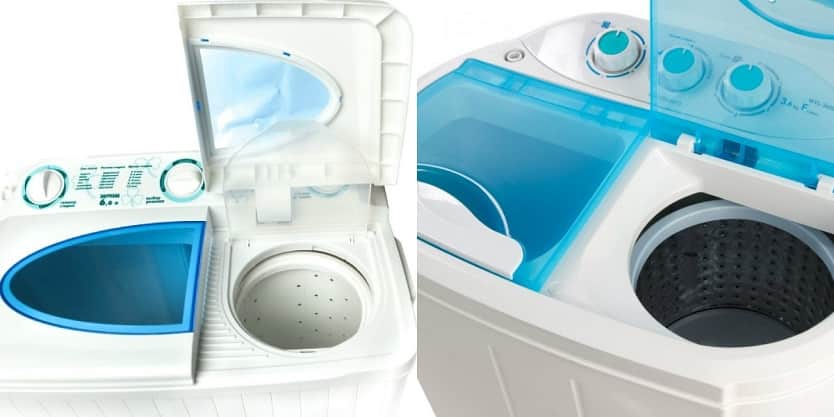
In fact, a semi-automatic washing machine is a large tank with a motor. It is the motor that performs the washing process. To clean dirty laundry:
- fill the tank with a suitable amount of water, pour detergent into it and lay the wash;
- turn on the timer and wait until the appliance launches;
- drain soapy water, rinse the laundry in a separate container or in the washing machine itself;
- wring out the wash.
Basically, it's pretty simple. But depending on the selected device, you will either have to heat the water yourself or wait for the built-in heaters to work. The spinning of the linen can be done by the machine itself, or again, you will have to do everything with your own hands. Therefore, before buying a semiautomatic machine, you need to know what they are and what are the differences.
Varieties of semi-automatic washing machines
So, washing machines are of two types:
- Activator;
- Drum.
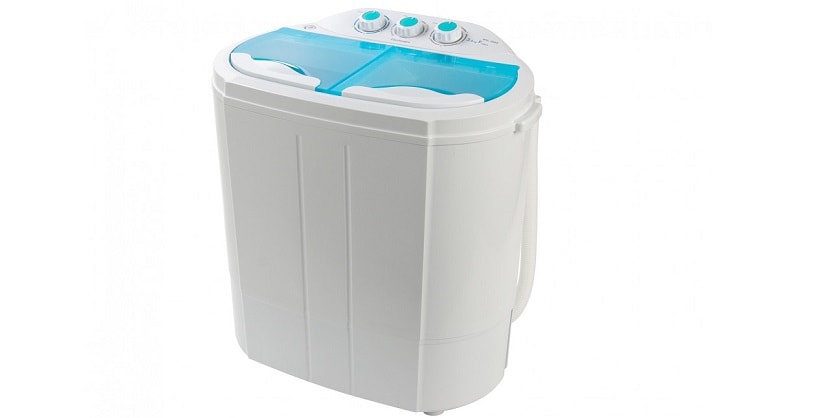
Activator machines
A more common, cheaper and lighter version of the semiautomatic device. A special activator is installed at the bottom of the device, which rotates the laundry inside the tank.
Semiautomatic devices of the activator type allow the device to be extremely lightweight and to simplify it as much as possible. They are designed for a long service life and practically do not break. By the way, according to experts, it is the activator rotation that is less harmful to clothes and home textiles - the fibers of the fabric are exposed to less intense stress, which means they are stored for a longer period.
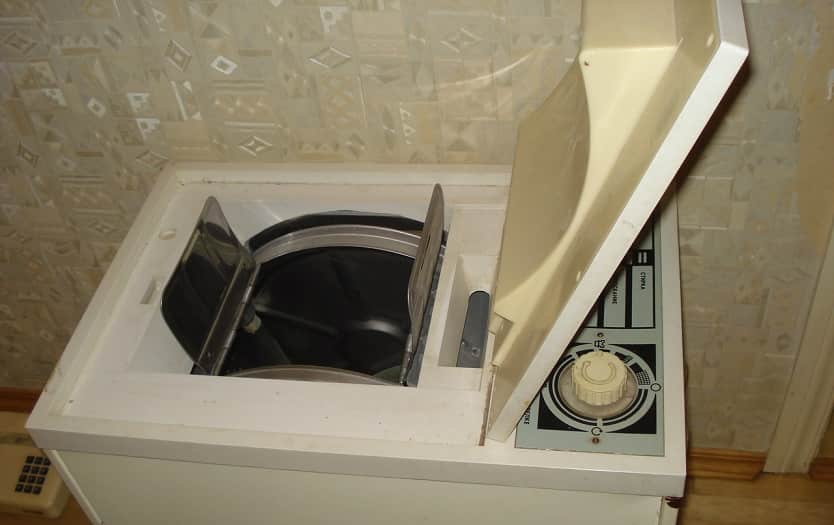
Drum machines
Has at its disposal a rotary drum in which the washing is put. The presence of a drum immediately makes the machine heavier and increases its cost. In addition, the capacity of such a machine is somewhat lower than that of an activator.
In addition, you can buy yourself a washing machine with one or two compartments. Single-compartment appliances do not wring out the laundry - you have to twist the wash by hand.
Semi-automatic machine with two compartments - this is the possibility of spinning using a centrifuge. However, remember that you should not squeeze delicate things in a centrifuge, and also, all the wash should be neatly and evenly laid in the spin compartment - then the centrifuge will do its job better.
Also, you can always choose a model with automatic water heating. Then you just have to fill the tank with water and plug the machine into the outlet.
Pros and cons of semi-automatic washing machines
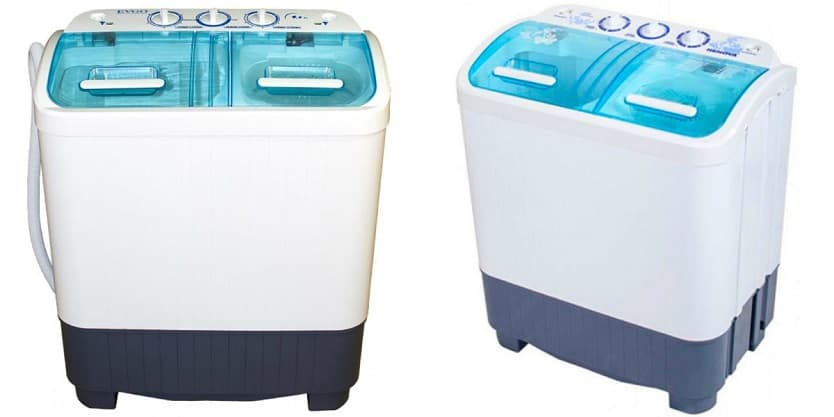
Before deciding whether you need such a device or not, you should still summarize all the advantages and disadvantages of a semi-automatic washing machine. To do this, we compared the opinions of experts, home appliances repairmen and reviews from the owners of such washing machines.
Semi-automatic advantages:
- Compact dimensions - due to its modest dimensions, the semiautomatic device can fit in the smallest room;
- Lightness - the heaviest and most bulky machine will not weigh more than 20 kg, which means that you can always easily move or transport the semi-automatic washing machine on your own;
- Autonomy - the semiautomatic washing machine does not need water supply or sewerage to operate, you only need a socket or connection to an electric generator;
- Economical - semiautomatic devices consume very little electricity and use not as much water as full-size devices;
- Top loading allows the wearer to add dirty laundry right during the wash;
- If you have installed a two-compartment semi-automatic washing machine, you can use two modes at the same time - wash or rinse in the main compartment and wring out the washed laundry in a centrifuge;
- Technical simplicity - you will never get confused in the management or in the large number of different washing modes and additional functions;
- Reliability - after all, simple mechanics are much less likely to fail than "smart" electronics;
- Affordable cost - semiautomatic devices attract buyers with a democratic cost and inexpensive repair, in addition, during use you will not need to spend money on expensive protective equipment against scale.
Disadvantages of semiautomatic devices:
- The need for constant control of washing, manual switching of modes, adding water, etc.;
- Modest functionality, a semi-automatic washing machine cannot boast of such "bells and whistles" as a variety of operating modes, foam control, hard water softening, washing quality sensors, etc .;
- The quality of washing does not always satisfy picky owners, because the semiautomatic machine will not cope with complex dirt, without additional washing by hand;
- Simple appearance - the design of such units, as we have already said, does not differ in originality and sophistication;
Rating of the best semiautomatic machine models
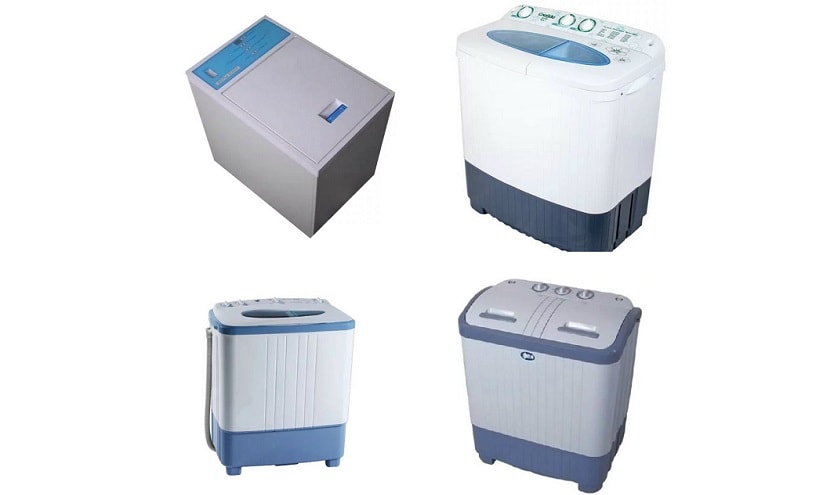
If you are quite satisfied with the ratio of the pros and cons of semiautomatic devices, then you can safely buy one of the offered models. Please note that most semi-automatic washing machines have "domestic" roots, but this in no way affects the quality of the assembly, because a modern manufacturer carefully monitors the level of production.
We advise you to pay attention to such brands as Saturn, Renova, Eureka, Snow White, Slavda and Fairy. Consider the most popular and technically interesting models in our ranking of the best semi-automatic machines:
- Assol XPB35-918S is a semi-automatic machine with two compartments, maximum load - 3.5 kg, spin power - 1350 rpm. Distinctive features: low power consumption - only 0.1 kW * h / kg and modest water consumption - up to 40 liters.
- SATURN ST-WK7601 is a semi-automatic machine with two compartments, top loading, with a capacity of 6.5 kg of linen. Spin power - 1300 rpm, energy class - A, there are two modes of operation. The same model can be selected in several color variations of the top panel.
- RENOVA WS-50PT - machine with two compartments and mechanical control. It erases 5 kg of laundry, squeezes it at a speed of 1350 rpm. The functionality of the machine has three operating modes, pumping out water using a pump, Electricity consumption class - A +.
- Snow White XPB 6000S - Maximum load - 6 kg of linen, energy consumption - class A, the machine is protected from overflow and automatically turns off at the end of work.
- Slavda WS-80PET is an interesting model of a semi-automatic machine. Loading - 8 kg. Spin - 2.5 kg with a power of 1350 rpm. Power consumption - A +, in the functionality of the machine - imbalance control and a protective filter.
- Fairy SMP-40N is a semi-automatic activator type. It erases 4 kg of laundry, squeezes the laundry at a power of 1300 rpm, power consumption - V. The lightest of all washers, can be connected to a water tap. Has at its disposal 2 washing programs.
A semi-automatic washing machine is the best option for rented housing, temporary use or installation in the absence of communications. With all its cheapness and simplicity, it is such an aggregate that can serve you for more than a dozen years, survive more than one move and uninterruptedly provide you with clean clothes and bedding. If you want to get such a reliable and unpretentious assistant - choose one of the models of our rating of semi-automatic washing machines and use your health!
See also:
- 15 best washing machines from 420–560 $ customer reviews
- 5 best Whirlpool washing machines according to customer reviews
- 6 best Bosch washing machines according to customer reviews
- 7 best Indesit washing machines by customer reviews
- 7 best washing machines LG

